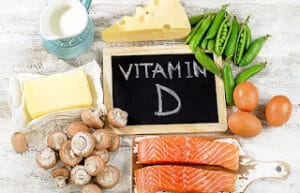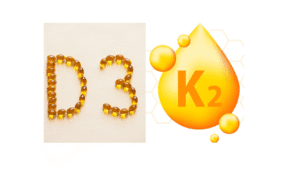Why Everyone Needs to Take Vitamin D3 with Vitamin K2
In the world of nutritional supplements, Vitamin D3 has gained widespread recognition for its vital role in supporting bone health, immune function, and overall well-being. However, what many people overlook is that taking Vitamin D3 alone may not be enough to maximize its benefits. To ensure proper calcium absorption and utilization, Vitamin K2 must be considered. Let’s explore why combining these two vitamins is essential for optimal health.
The Role of Vitamin D3
Vitamin D3, also known as cholecalciferol, is a fat-soluble vitamin that is required for calcium absorption in the intestines. Vitamin D3 increases calcium absorption in the intestines. Without enough Vitamin D3, calcium from the diet is not efficiently absorbed, leading to potential deficiencies. It plays an important role in maintaining healthy bones and teeth, regulating immune responses, and even supporting mood and cognitive function. Since modern lifestyles limit sun exposure, the body’s natural way of producing Vitamin D3.Many people rely on supplementation to maintain adequate levels.
Natural Sources of Vitamin D3

Fatty fish (salmon, mackerel, sardines)
Cod liver oil
Egg yolks
Fortified dairy products (milk, cheese, yogurt)
Fortified plant-based milk (almond, soy, oat)
The Importance of Vitamin K2
Vitamin K2, a lesser known but equally essential nutrient, is vital for directing calcium to where it belongs like bones and teeth while preventing its accumulation in the arteries and soft tissues. Without sufficient Vitamin K2, the calcium absorbed due to Vitamin D3 intake may deposit in arteries, increasing the risk of cardiovascular issues. Vitamin K2 activates proteins like osteocalcin and matrix GLA protein (MGP), which help bind calcium effectively for bone mineralization and arterial protection. Vitamin K2 Directs Calcium to Bones and Teeth.
Natural Sources of Vitamin K2
Grass-fed dairy (cheese, butter)
Egg yolks
Organ meats (liver, heart)
Chicken (especially thighs and drumsticks)
Certain hard cheeses (Gouda, Brie)
Why D3 and K2 Work Best Together
Enhanced Calcium Utilization:
Vitamin D3 increases calcium absorption from food, while Vitamin K2 ensures that the absorbed calcium is directed to bones instead of accumulating in blood vessels.
Heart and Arterial Health:
Taking Vitamin D3 without K2 can lead to calcification in arteries, increasing the risk of cardiovascular diseases. Vitamin K2 helps prevent this by directing calcium to the bones. Preventing Calcium Misplacement (Protecting Arteries & Heart Health). Vitamin D3 alone increases calcium levels, but without K2, excess calcium can end up in the wrong places, like arteries and kidneys. Vitamin K2 ensures that calcium does not deposit in arteries, preventing hardening of blood vessels and reducing cardiovascular risk.
Supporting Bone Strength & Reducing Fracture Risk.
Synergistic Benefits for the Immune System and Inflammation.
Vitamin D3 supports immune function by regulating T-cells and reducing inflammation. Vitamin K2 has anti-inflammatory properties, helping prevent chronic diseases related to excess inflammation.
Enhancing Brain and Mental Health.
Both vitamins contribute to brain health by supporting cognitive function and reducing the risk of neurodegenerative conditions. They may also help regulate mood, potentially reducing symptoms of depression and anxiety and improving mental well being.
Who Should Take D3 with K2?
Individuals with limited sun exposure.
People with osteoporosis or those at risk of bone fractures.
Those concerned about heart health and arterial calcification.
Anyone supplementing with Vitamin D3 to ensure proper calcium regulation.
How to Take D3 and K2 for Best Results
Choosing the Right Supplement
When selecting a supplement, look for one that contains both Vitamin D3 and Vitamin K2.
Choose the Right Form:
Vitamin D3 (cholecalciferol) is the most effective form. Vitamin K2 (MK-7 form) is preferred because it stays active longer in the body.(as MK-7, which has a longer half-life and better bioavailability).
Optimal Ratio
The ideal ratio depends on individual needs, but a common recommendation is 100-200 mcg of K2 per 5,000 IU of D3.
Take with Healthy Fats
Since both vitamins are fat-soluble, consuming them with meals that contain healthy fats (avocado, olive oil, nuts) enhances absorption.
Conclusion
While Vitamin D3 alone is necessary for overall health, pairing it with Vitamin K2 ensures that the benefits are maximized safely and effectively. By working together, these vitamins support stronger bones, better cardiovascular health, and improved immune function. If you’re already taking Vitamin D3, consider adding Vitamin K2 to your routine to fully harness their combined power for optimal well-being. Vitamin D3 and Vitamin K2 work together in the best way by ensuring that calcium is properly absorbed, utilized, and directed to the right places in the body.
Taking Vitamin D3 and K2 together ensures that calcium strengthens bones instead of harming arteries, providing optimal bone, heart, and immune health. If you supplement with D3, always consider pairing it with K2 for the best results!

